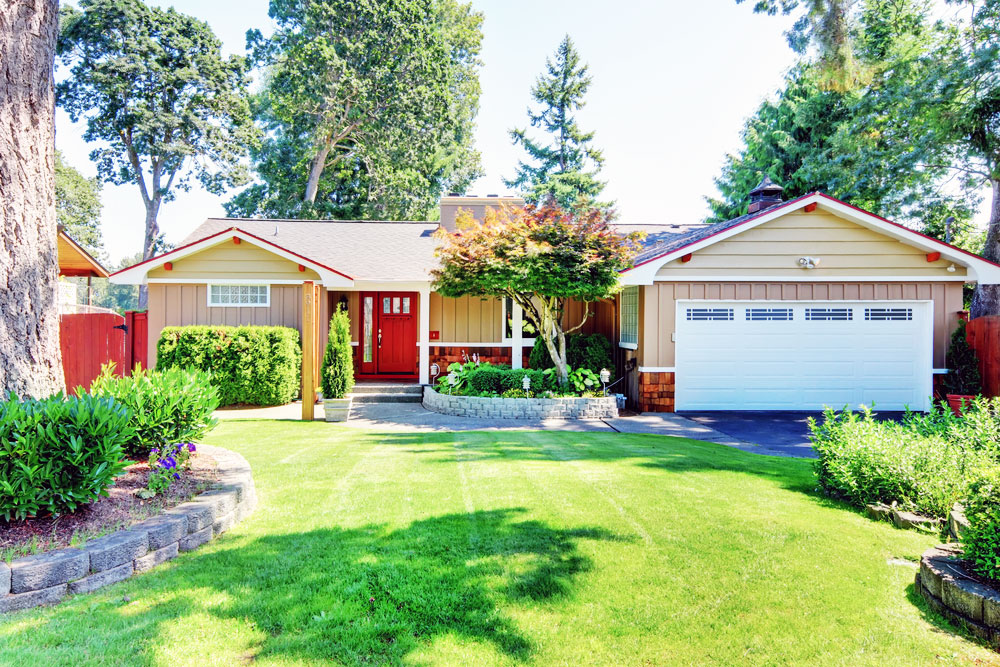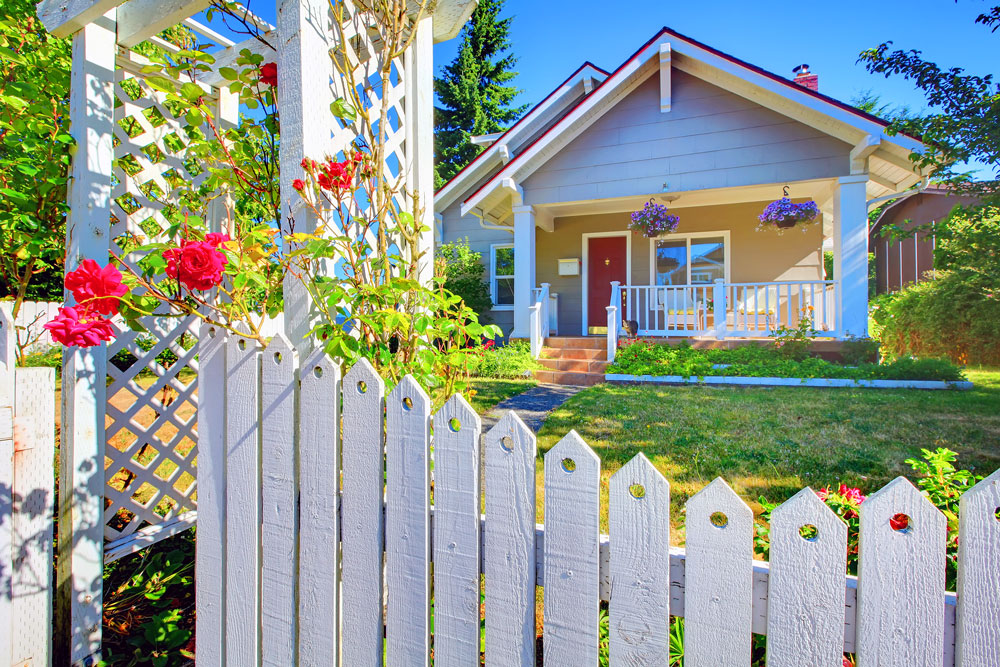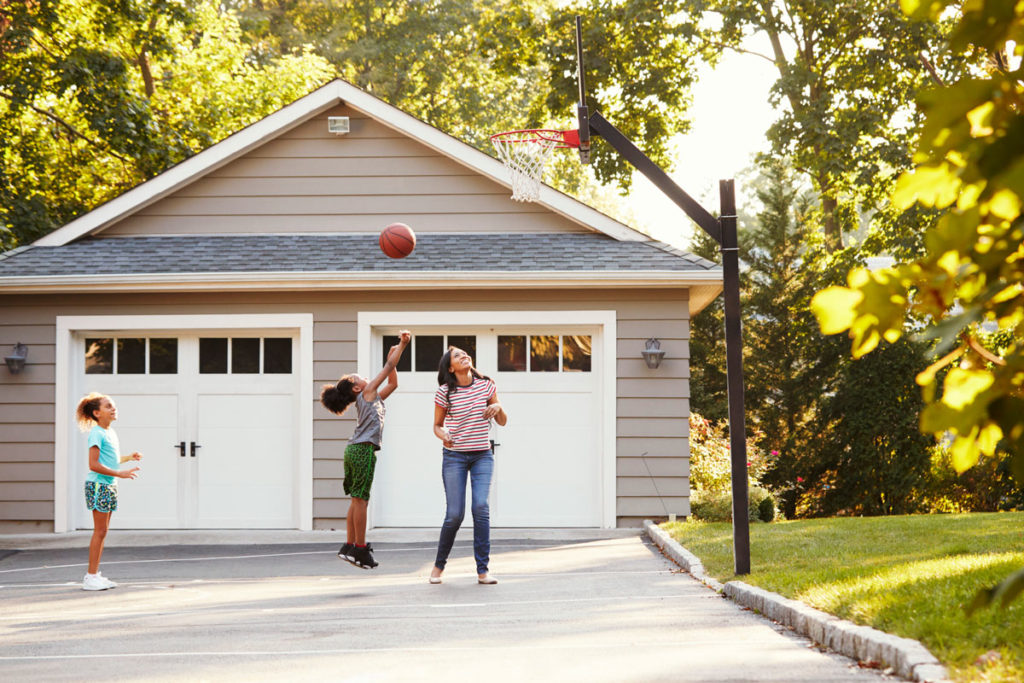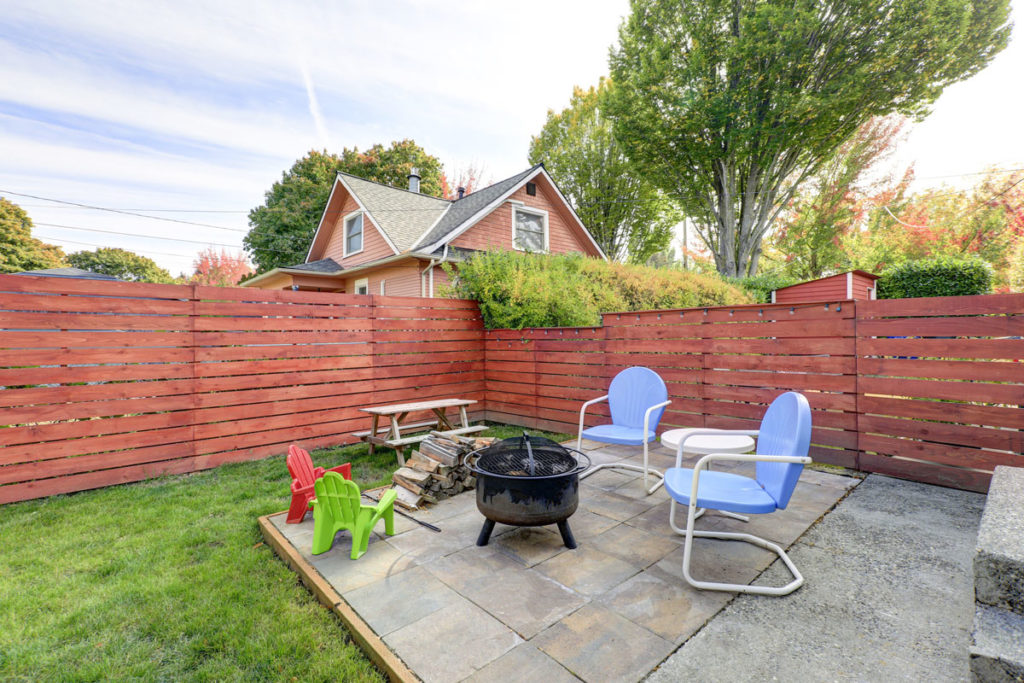A lawn in summer is a wonderful thing! It is the proper location for picnics, barbecues, slip-n-slides, and more. Forget chemical fertilizers and herbicides. You can still enjoy a healthy SAFE lawn by following natural lawn maintenance tips below.

Jason Haeger is the Webmaster and Editor of Benchmark.us and the Benchmark.us network of websites. In addition to design, web development, and writing, he enjoys playing guitar, gardening, reading, and spending time with his wife and kids.

A lawn in summer is a wonderful thing! It is the proper location for picnics, barbecues, slip-n-slides, and more. Forget chemical fertilizers and herbicides. You can still enjoy a healthy SAFE lawn by following natural lawn maintenance tips below.

Get your offer accepted without the highest bid. Can't raise the competition with a higher offer? Use storytelling to win the seller over. Read it here.

Should you buy a home in the spring, or should you wait? Here are four good reasons to buy now.

Rent or Buy? Don't be a fool. Whichever you choose, go in with your eyes wide open. We briefly explore the difference.


Do you suffer from curb envy? Do you want bragging rights for the most inviting home on the block? Have you just moved in, and want to dress the entrance with your own personal style? Or, are you looking to sell, and want to make your home more appealing to potential buyers?
No matter your reason, improving the appearance of your home when viewed from the street level, also known as curb appeal, can be done without breaking the bank.
It can be tempting to look through home improvement websites or Better Homes and Gardens for ideas. However, before making big plans, start with the easy things. You may be surprised at how much difference it makes!
Before spending any money, focus on maintaining the features your home already has. Even a manicured front landscape can go a long way.
Once everything is in great shape again, it’s time to start making some striking visual changes!
Making a good first impression is important for forging new relationships, and for others taking you seriously. Your home’s curb appeal the the first impression for visitors, guests, neighbors, and potential buyers (if you’re selling). Your choices for dressing up your home’s curb appeal will ultimately reflect your own personality and outlook.
You don’t have to spend a lot to get a great look, so get started, be mindful of your choices, and have fun! Who knows, you may even make a few friends in the process.
Benchmark Brings You Home.



So, you are home shopping, have found ‘The One,’ and you’re ready to make an offer. Are you sure you know what you’re doing? I mean, of course you know that you plan to make an offer, but do you know what comes with the house that you think you are ready to buy? The odds are good that you have not considered everything, and that you may be in for an unwelcome surprise. This is especially true if you are a first time home buyer.
At Benchmark, we want you to be confident in your decisions. It is part of our mission and dedication to helping our clients fulfill their piece of the American Dream of homeownership. Protect yourself by evaluating factors in these 4 categories before placing your offer.
You should already be pre-approved for a maximum loan amount. Make sure the asking price is fair, and make sure your offer fits well within your tolerances for your pre-approval amount. It’s also a good idea to check the expenses for the house, like utility bills, property tax, insurance, and HOA dues, if applicable. Make sure the monthly financial obligation fits within your range of affordability. Lastly, make sure you have easy/quick access to your funds for a down payment and earnest money. If your offer is accepted, be ready to pounce!
Be really sure you are as aware as you can be of what you’re buying. Take another walkthrough, and bring a bright flashlight, a level, a tape measure, or anything else you think you may need in order to go into a 30 year obligation with eyes wide open. Take a look at the seller’s disclosure, so you are in the loop about any upgrades or repairs that may have been done to the top candidate for your future home. This can help give you an idea of any work that you can avoid doing, or that you may need to get done after you’ve become the new fearless owner of the abode.
Get to know the neighborhood and the general location of the home you have your sights set on. Find the assigned school, its rank, distance from the home, and wether you think it’s a good fit for your family’s values. Check the distance and availability of business you rely on, like gas stations, grocery stores, as well as proximity and availability of entertainment, cafes, and restaurants. How far is it from your place of work? What would your new commute look like? It is important to weigh all of this considerations to prevent a future case of buyer’s remorse.
It can also be a good idea to visit the house at different times of the day, and on different days of the week. This can help give you a feel for the overall culture of the neighborhood, as well as what kinds of noises and activity to expect. Doing this may also give you a better idea of traffic congestion spots. You may also want to consider checking crime in the area, and registered sex offenders who may live nearby. Also be aware of neighborhood amenities provided by the HOA, or community cooperation. Last but not least, meet the neighbors! The best way to get a feel for the neighborhood is to talk to someone who has lived there for awhile already.
You have checked the financials, decided that you are prepared, and are aware of the total cost to live in the home you want to buy. You are going in with eyes wide open, fully aware of the school situation, access to resources, and the compatibility of your desired neighborhood. Most importantly, you are aware of any issues present in the house itself, and the work that was recently done.
If you are looking for a house right now, and are preparing ahead of time, great job! Researching the next step before you are there is a display of wisdom. Are you pre-approved? Without being pre-approved, any offer you make is unlikely to be accepted without an approved loan amount, unless you plan to buy in cash. (if so, why are you reading this on a mortgage site? You should be writing your own finance blog!)
If you are looking to get pre-approved, we make it easy. More than that, our expert loan officers will match your goals with the perfect loan for your unique situation. We often refer to ourselves as “The Benchmark Family”, and when you choose to work with us, you become part of it, too. Ready to get started?
Find your Benchmark branch and contact them today for a hassle-free experience.Give us a call or contact us today. At Benchmark, we’ve got your back.Give me a call, send me an email, or request a call today. My team and I will take good care of you.
Welcome. Benchmark Brings You Home
![]()

Does renting make you feel a little too transient? Is community important to you? It may make sense to become a homeowner. Almost nothing can help you put down roots, be involved in your community, or serve as an automatic catchment for memories quite like owning your own home.


With student debt making headlines on a regular basis, and the rates of homeownership being lower, is there a connection? Maybe.
In the first issue of Consumer & Community Context, a publication from the Federal Reserve, an article by Alvaro Mezza, Daniel Ringo, and Kamila Sommer, Federal Reserve Board Division of Research & Statistics entitled, “Can Student Loan Debt Explain Low Homeownership Rates for Young Adults?”, Mezza et al write,
While many factors have influenced the downward slide in the rate of homeownership, some believe that the historic levels of student loan debt have been particular impediments. Indeed, outstanding student loan balances have more than doubled in real terms (to about $1.5 trillion) in the last decade, with average real student loan debt per capita for individuals ages 24 to 32 rising from about $5,000 in 2005 to $10,000 in 2014. In surveys, young adults commonly report that their student loan debts are preventing them from buying a home.
and,
We found that a $1,000 increase in student loan debt . . . causes a 1 to 2 percentage point drop in the homeownership rate for student loan borrowers during their late 20s and early 30s.
In a study by the Federal Reserve in 2017, they found that every $1k in student loan debt postpones homeownership by about two and a half months. However, “postponed” is not the same as “canceled”! By time time higher education graduates reach their thirties, student loan debt has a reduced affect on rates of homeownership.
We have written before about the wealth-building power of paying a mortgage over paying rent, and student loan debt is similarly and investment into one’s career. The boosted earning potential of a generation of more college graduates is bound to catch up to the burden of the debt that helped fuel it.
There is no one-size-fits-all answer to this question. No matter whether you have prioritized paying your student loan debt or saving for a down payment, if you would like to take a closer look at what makes the most sense for you, contact us. Our job is to work with you to find the right solution for your financial goals.
Find your Benchmark branch and contact them today for more information.Give us a call or contact us today. At Benchmark, we’ve got your back.Give me a call, send me an email, or request a call today. My team and I got your back.

Maybe you want to remodel the kitchen, paint the walls, or re-tile the shower, but you either don't have permission, or you know it would be throwing money away. Here are a few more reasons why home owners enjoy more privacy and more security than renters.


If you are thinking about refinancing, you probably have a good reason. Maybe you are curious if you could save money by locking in a lower interest rate. Maybe you wonder if you could use some of the equity you have established in your home. Whatever your reason, here are 5 things to know before deciding if refinancing makes sense for you.
Not sure if Refinancing is a good idea? While refinancing may not be the best choice for everyone, there are a few good reasons to refinance.
Maybe you are motivated to pay off your home sooner. If so, by refinancing to a shorter term mortgage (for example, a 15 year mortgage from a 30 year mortgage), you could set yourself up to be paid off in nearly half the time, depending on the maturity date of your existing mortgage.
Shorter term mortgages often come with smaller interest rates than their longer term counterparts. This can make the increased mortgage payment easily justifiable with the potential decrease of interest payments overall.
Maybe you bought when interest rates were higher. While timing the market is a risky practice, at best, if the current average interest rates are significantly lower than the rate on your current mortgage, refinancing may look like an attractive option.
If your current mortgage is a few years old, refinancing into a new mortgage with the same term could reduce your monthly payment obligation. While this will likely increase the total interest you will have paid over time, the lower payment could free up cash for other expenses or goals.
If you opted for an adjustable rate mortgage due to a lower starting interest rate, you have likely noticed the periodic shifts, up or down, that your interest rate may have taken since originating your mortgage. If you are seeking a little more financial consistency, refinancing with a new fixed rate mortgage may be an appealing option.
Has your home increased in market value since you bought it? Do you think your equity could be used better than being tied up in your home? A Cash Out Refinance may be for you. Mind the risk!
Do you have other debt with higher interest rates? Do you think it would be a good idea to roll that debt into your mortgage instead? A Cash Out Refinance may be an appropriate option for you. Just like above, we strongly recommend that you mind the risk!
Low down payment mortgages are a great way to take advantage of the right opportunity, but it comes with Private Mortgage Insurance. In order to get a new loan without PMI, you will have to have at least 20% equity in your home. If you have that, dropping the added monthly expense for the PMI could help pay your home off sooner (with a shorter term mortgage), or result in more available cashflow on a monthly basis.
The Amortization date (or the time until the death of the loan) is an important aspect to consider if you think you may want to refinance your home. A longer term (like the common 30 year mortgage) will have lower monthly payments, but means you will be paying more interest overall, and paying for more years. A shorter term, like a 15 year mortgage, benefits from less overall interest cost due to fewer interest payments. Shorter terms also often come with lower interest rates than their 30 year counterparts, helping you save even more over the long run. However, a shorter term also means higher monthly payments, as the principle is spread over a shorter period of time.
Deciding which term is right for you will depend on your monthly cash flow, and your personal goals. Your loan officer can help you to determine the right loan for you.
The costs associated with Refinancing can be complicated, when all is taken into consideration. If your goal is simply to save money, it may or may not make financial sense to refinance. Your loan officer can help you consider all facets that may effect the overall cost or benefit of a refinance.
If you are refinancing for a different reason, do the math to be clear on where you stand. A mortgage is a big commitment, and it’s a good idea to thoroughly understand the new agreement before jumping in.
Total Closing Costs / Monthly Savings = Break-Even Point
The “Break-Even Point” is calculated by a simple formula, dividing the total closing costs by the monthly savings. The calculator linked below can help give you an idea about what your break-even point might be. This is the point in the life of the new loan where the new mortgage effectively pays for its own closing costs.
Why is this useful? If your goal is to save money, you may want to stay in your current mortgage if you plan to sell your home before the break-even point. Selling before you’ve reached the break-even point will end up costing you more overall.
As mentioned earlier, a mortgage is a big commitment. There is always risk present when taking out a loan, especially when defaulting means losing your home. This is especially important to consider before taking a Cash Out Refinance to consolidate debt, especially debt that is not secured.
If you miss payments on a credit card, or student loan, you will have collectors giving you a hard time. If you the same debt is rolled into a mortgage, it becomes guaranteed by your home. Defaulting on a mortgage could result in losing your home. While consolidating high-interest debt into a low-interest mortgage can be a good long-term strategy, it may not be for everyone.
At Benchmark, we do more than sell a low interest rate. We look closely to help you determine the right loan for you. Even if you don’t feel ready, talking to us now can help you set a course for success.
Find your Benchmark branch, and contact them today for more information.Give us a call or contact us today. At Benchmark, we’ve got your back.Give me a call, send me an email, or request a call today. Along with my Benchmark community of mortgage pro’s, I’ve got your back.